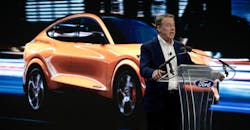Ford to Build $3.5 Billion Michigan Battery Plant
Ford Motor Co. announced plans on Monday to spend $3.5 billion on a new plant in Michigan to manufacture lithium-iron-phosphate (LFP) batteries for electric vehicles.
BlueOval Battery Park Michigan, which could be up and running by as early as 2026 with 2,500 employees, would be the first LFP battery plant in the United States backed by an automaker. The site of the plant is Marshall, a city of about 7,000 located in the south central part of the state near Battle Creek, about 90 minutes west of Detroit on I-94. The 2.5 million square foot battery facility is slated to rise on 1,900 acres of farmland that the state has pegged for a project of this size.
Tesla is currently the only automaker in the U.S. to use the LFP batteries in its vehicles. Using less expensive raw materials, LFP batteries cost less to produce, have a longer lifespan and are faster to charge but have a shorter range than the nickel-cobalt-manganese (NCM) batteries used in most U.S. EV models. Both LFP and NCM batteries are lithium-ion batteries.
Ford plans to start using LFP batteries in its EVs this year, starting with the Mustang Mach-E. The automaker said in a statement that having an LFP plant of its own will help it scale production of the batteries for its vehicles more quickly.
As part of an agreement with the world’s largest battery manufacturer, China-based Contemporary Amperex Technology Co. Ltd. (CATL), Ford will manufacture LFP batteries using CATL’s technology. CATL currently has 13 plants in Europe and Asia.
Ford engineers will make changes to adapt CATL's technology to Ford vehicles. A Ford subsidiary will control the plant.
The federal Inflation Reduction Act passed last year provides incentives for companies locating battery plants in the United States.
United Autoworkers President Ray Curry praised Ford’s announcement, saying in a statement that the plant “will create good-paying union jobs that will benefit the community and maintain strong wage and benefit standards in the auto industry.”
One of Virginia’s poorest counties had originally been a contender for the plant along with Michigan, but in December Virginia Gov. Glenn Youngkin rejected Ford’s proposal. “While Ford is an iconic American company, it became clear that this proposal would serve as a front for the Chinese Communist party,” a Youngkin spokesperson told the Detroit News in January 2022.
Ford’s fourth quarter profits, announced earlier this month, were down in year-over-year reporting, from $12.3 billion in the prior year to $1.3 billion. All told, the automaker had a $2 billion loss in 2022, compared to $17.9 billion in profits in 2021.
